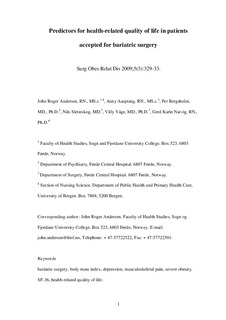Predictors for health-related quality of life in patients accepted for bariatric surgery
Andersen, John Roger; Aasprang, Anny; Bergsholm, Per; Våge, Villy; Sletteskog, Nils; Natvig, Gerd Karin
Peer reviewed, Journal article
Permanent lenke
http://hdl.handle.net/11250/149337Utgivelsesdato
2009Metadata
Vis full innførselSamlinger
Originalversjon
Andersen, J., Aasprang, A., Bergsholm, P., Sletteskog, N., Våge, V., & Natvig, G. (2009). Predictors for health-related quality of life in patients accepted for bariatric surgery. Surgery For Obesity And Related Diseases: Official Journal Of The American Society For Bariatric Surgery, 5(3), 329-333 http://dx.doi.org/10.1016/j.soard.2008.11.012Sammendrag
Background
The relationship among musculoskeletal pain, depression, and health-related quality of life in patients with severe obesity who are accepted for bariatric surgery should be explored further.
Methods
In this cross-sectional study, we measured the health-related quality of life using the generic questionnaire “Short-Form 36 Health Status Survey.” Multiple regression analysis was used to explore associations between the predictors (musculoskeletal pain and depression) and the physical cumulative summary (PCS) and mental cumulative summary (MCS). Age, gender, body mass index, and the number of co-morbidities were entered as covariates.
Results
The study subjects included 28 women and 23 men, with a mean age of 37.7 years and a mean body mass index of 51.9 kg/m2. The PCS and MCS scores were very poor compared with the age- and gender-adjusted population norm (P <.001). The presence of musculoskeletal pain was associated with a score that was 10.97 points lower on the PCS (P <.001) and 7.05 points lower on the MCS (P = .031). The presence of depression was associated with a score that was 20.89 points lower on the MCS (P <.001); no significant association was found between depression and the PCS.
Conclusion
The results of this study have shown that musculoskeletal pain was strongly associated with lower scores on the PCS and MCS, and depression was strongly associated with a lower score on the MCS.
Beskrivelse
Dette er en post-print forfatterversjon. For forlagsversjon, se Surgery for obesity and related diseases, tilgjengelig online at http://www.soard.org/article/S1550-7289%2808%2900835-6
